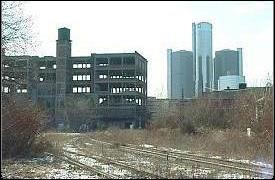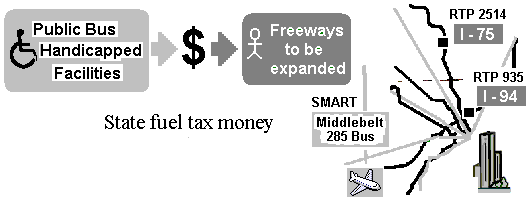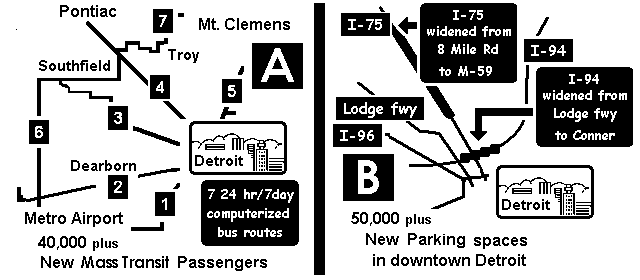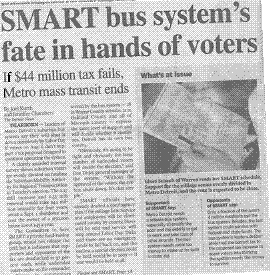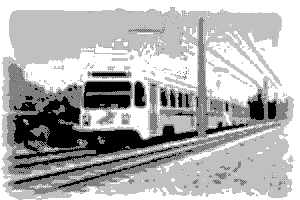|
Back to ~ Homepage |
|
A Humanitarian Cause for Public Transportation - Putting safety first with full busses and education.
The abolition
of state revenue sharing for mass transit in
Michigan Please support the majority vote of no, next November 8, 2022 ~ click here ~ Please follow in chronological order to understand why only the passengers have the solutions. Legislators in Michigan are looking for new money to help build, operate, and maintain our public mass transit systems. But instead of raising fuel taxes, introducing new forms of fees or encouraging competition and more efficient use of our transportation system, they are forcing local governments to raise nonuser funds locally.
|
|
The loss of state fuel taxes for public bus service ~ back to top
The regression
of public bus service ~ Livonia, Michigan, U.S.A. ---
~ return No person in the United States shall be excluded ~ means discrimination against all is valid when applied to the elimination of the SMART 285 bus route. This was the only public handicapped transportation facility serving minorities*(6) connecting the metropolitan airport and downtown Detroit in the two counties (Wayne, Oakland) of the freeway expansions approved for federal grants " I-94 (SEMCOG RTP 935) and I-75 (RTP 2514)*(5)" The Michigan Department of Transportation will not provide or attempt an equivalent combination of both state and local operating funds essential to serve the transportation needs of all. This shifting of subsidies from one form of transportation--in this case, from buses to larger urban freeways has both financially strapped local governments and deprived community transit. This is against the Civil Rights Act of 1964 Sections- 601,602 to receive federal transportation grants to expand freeways unless compliance is first enforced. This is because a relation of equivalence was denied from state funds without an alternative, honor of contract or public vote to protect all qualified state and local funding first.. Disparate impact on low income and minority persons was the result of the Livonia public bus reductions shown by statistics.*(6) The correlations between the multi-billion dollar federally approved freeway projects in above paragraphs and the November 27, 2006 Detroit and Livonia bus service reductions are intentionally neglected without a public vote for increased state funding. Federal transit grants are denied under Chapter III of Circular Sections- 4702.1 for pre 1995 SMART public bus service. These losses which included the Middlebelt 285 were seriously ignored as transit advocates and road lobbyists alike celebrated the shifting of even more federal grants away from low income persons and minorities to build and operate new luxury rail service and expand freeways. They will quickly slice through the second poorest areas in the United States as documented by population losses from 2000 to 2006.*(7) The only exception is New Orleans during hurricane Katrina in 2005. |
|
The morality of protecting existing tax funds ~ back to top
The same money used to pay for NEW Freeway expansions Discrimination ~ return The replacement of state fuel taxes is an unethical practice in handling public funds because these funds provide essential transportation needs to many who are unable to provide for themselves. Federal laws define that alternatives must be provided to preserve the importance of priority for everyone. This is not the case for the I-75 Expansion Project (RTP 2514).*(5) When viewed in its entirety, it is not readily accessible to handicapped persons thus does not conform to TITLE 45. The alternate facility of Woodward Ave and related travel options were "broken up" and/or eliminated as a result of the neglect to keep in an existing state an equal balance of funds. The Federal Transit Administration of the United States has approved a $426 Million grant for this project to be paid to the Michigan Department of Transportation. The matching state funds for this grant came from the SMART bus service reductions on November 27, 2006 because of $50 Million per year raised from local sources to replace same funds. This harmed the low-income and minorities because of derisive newspaper stories, complaints, late buses, deficits and an illegitimate bus merger "House Bill 5467" with the city of Detroit. The restoration of essential bus service with previously utilized funds was neglected as compensation was not secured first from user fees and private investments to raise matching funds. The stated purpose of the grant no longer can correct the defined deficiency of congestion because of thousands of cars have been forced onto the roads. This shift of costs away from drivers has directly resulted in a loss of jobs in inner city Detroit.*(1) The MDOT I-94 Rehabilitation Project (RTP 935) in Detroit is a freeway expansion along an axial line with existing alternate public bus routes known as Michigan and Gratiot Aves. This relationship is something which can be chosen instead as a "freedom of choice" thus this project is a privilege demanding fulfillment of a contract. The agreements under Act 51 247.660b are not utilized under the state constitution to promote a free-market economy of abundance and prosperity. The coherence and connections of surrounding areas are not only neglected but destroyed by not using the current space and resources efficiently and competently. There are no provisions for users to pay a decent amount for any basic needs of those unable to drive, the disabled or for communities to thrive. The allocated budgets do not include working street lights, wheelchair lifts, park and rides, computers, time-tables to coordinate all modes of travel, shelters, buildings and other essentials. The design is simple and barren. This project is not accessible, except for the large trash importers and a few others. This Billion dollar project is unworthy of taxpayer's money. Devolution ~ return The transference of rights to surrender property and responsibility to another; especially : of powers to local authorities by a central government. In the case below, the Michigan Department of Transportation (MDOT) to individual counties, cities and townships. The freeways and projects in illustration below are not in compliance with the AMERICANS WITH DISABILITIES ACT - ADA of 1990 TITLE II--PUBLIC SERVICES, in relationship to the funding of SMART and public bus service. Also, civil rights. The fundamental issue of securing permanent funds for transit was denied without a vote to keep state operating funds in the case of the November 2006 SMART public bus service reductions. This is documented in the FTA database as evidenced by the same money shifted to pay for more road space to reduce the cost of driving. This is a devolution in conjunction with the competent use of tax dollars to attract more riders as essential to lower per passenger costs. Mass transit came first to downtown Detroit, and then the freeways followed. The August 2022 SMART property tax renewal is a Tax Shift, thus all previous funds are compulsory, even if defeated.
"Community Transit" verses "Expanded Freeways" "Community Transit" is an alternative to the private vehicle to meet specific needs of individuals and neighborhoods. These needs include connecting the poor and unemployed with jobs and training facilities, offering the elderly access to needed services and mobility for people with disabilities. The proposed reforms to correct the disputed funding deficiencies do not include expanding fuel taxes and user fees or collecting any tax/fees for new facilities defined as I-75 and I-94. The corresponding alternate handicapped facilities defined respectively as public bus facilities along the routes of Woodward, Fort, Michigan and Gratiot and related routes are deprived according to ADA regulations with regard to both ability to pay and services rendered. The result is a lowering of effective power, vitality and essential quality to an enfeebled and worsened state and a degenerate condition of physical characteristics from a level representing the norm of earlier generations. The enhancement and protection of current policies and/or increased efficiencies can resolve these issues of impairment. The United States uses more foreign oil then any country in the world and "regional transit taxes" are making this dependence even worse as per-passenger costs are rising faster than wages.*(2) This has not fully happened in Michigan yet, but can should the public vote for higher taxes without regard to competence, wages and cost controls. The alternate handicapped facilities are treated as unworthy of regard with no attention. This can only be properly corrected from increasing fare box revenues from employment and protecting fuel taxes.*(3) |
|
The economics of using state fuel taxes ~ back to top The cost of the freeway projects on side B in drawing below are in references below under *(6). The plan for the computerized buses presented on side A were proven to work in June 2003 in the western Detroit suburb of Livonia with industry support by top SMART officials. Their extinct Middlebelt 285 regional bus route was competently restored from 1995 until November 2006. Essentially, a NO vote can be used next August 2022 to raise money for "Operation Bring Back SMART" by delaying or stopping the FTA approved mult-billion dollar freeway expansions first.
The I-94 and I-75 freeway expansion projects (as shown in B above) will worsen traffic congestion into downtown Detroit. This is because MDOT will not provide mass transit alternatives (as shown in A above) by taxing the cost of driving to favor those who use mass transit and to remove cars from congested freeways during rush hours. Proponents of Regional/Local transit tax increases want to use money from the Michigan Transportation Fund (State fuel tax) to add High Occupancy Vehicle (HOV) lanes on I-75 at the cost of $530 Million dollars and expand other freeways and roads instead of paying for frequent bus service where practical. The PDF document at the bottom of this page titled "The SMART Millage Vote" shows allowing multiple tax mechanisms to pay for public bus service is the best solution for all. |
|
The protection of funds must be made public ~ back to top
Statistics show increasing state CTF funds for mass transit along with increased efficiencies is most effective to attract business, enforce federal disability policies and protect our environment. These funds are about $90 Million per year for SMART and DDOT (as of 01/05). The claims by transit tax advocates that these funds are not enough to support "community transit" for the transit disabled is counter-productive and discrimination unless minimum federal and industry standards can be met. The viewpoint of "There is no correlation between driving and using mass transit" is false, thus a two-tiered approach to utilize fuel and property taxes/fees to support dedicated operating budgets is proposed in these Webpage's. It is a constitutional right in the United States to force the "issues" of state fuel taxes and our industries by means of competition and decent wages to help pay for "transit operating subsidies". State fuel taxes are not a requirement to receive federal transit grants or support mass transit. But, statistics from the Citizens Research Council of Michigan and the Brookings Institute shows fuel taxes are effective to obtain and promote responsible use of federal transit funds. freeways.html "3"> |
|
Transit Advocacy Groups ~ back to top
Improving and expanding Detroit's transit systems and upgrading their images are worthwhile goals that deserve significant effort and intensive promotion. And all special interest groups have a "natural" tendency to overemphasize both the virtues and success of their causes in order to gain attention. But it is also a good idea to retain a statistically accurate and objective understanding of funding requirements when dealing with such complex and controversial issues, especially those that involve billions of taxpayer dollars. Evidence based on urban transport in southeast Michigan reveals substantial technical inefficiencies that have led to public transit deficits and wasted state fuel taxes for useless multi-million dollar transit studies on plans that remain on the shelf. It is futile to expect public officials to pursue more efficient policies and weigh costs and benefits when deciding transit service without sufficient user fees from the fare box. Basic environmental oversight is currently neglected in Michigan, specifically the destruction of farmlands and forests by shifting the cost of transportation away from users to pay for expanding roads. Leaders continue to siphon-off the gas tax from mass transit without acquiring more user fees and privatization as necessary. The situation in Michigan is unique in relationship to most other parts of the country because we can use the state fuel tax which demands frugal use. It's unfortunate political forces are at work to inhibit constructive changes by imposing more government and regulations without protecting this funding mechanism.
|
|
References and Publications ~ back to top
|
